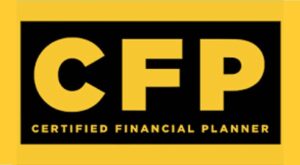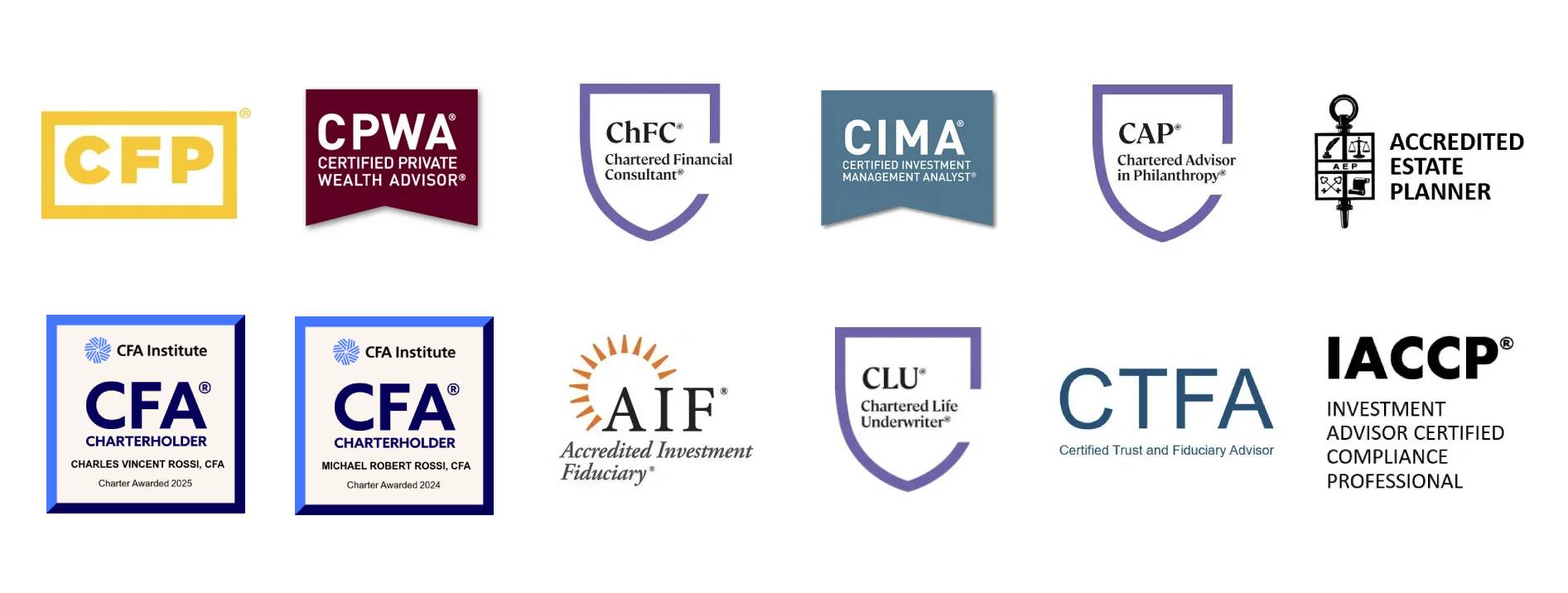
Our Credentials Explained
The enduring truth of managing wealth is that mastery is an evolutionary and multi-disciplinary journey of continual learning and problem-solving.
There is complexity to wealth management that requires more advanced education and training, deeper and broader experience, and the integrity and commitment to excel.
IT’S JUST PART OF WHAT WE DO.
Fiduciary Wealth Management
Scottsdale | Phoenix
Scottsdale | Phoenix
Our Credentials Explained
Wealth management is multidisciplinary work.
You don’t need to be us.
You just need to know us.
CONSIDER EVERYTHING
Our Credentials
Explained
Explained
The enduring truth of managing wealth is that mastery is an evolutionary and multi-disciplinary journey of continual learning and problem-solving.
There is complexity to wealth management that requires more advanced education and training, deeper and broader experience, and the integrity and commitment to excel.
IT’S JUST PART OF WHAT WE DO.
Fiduciary Wealth Management
Scottsdale | Phoenix
Scottsdale | Phoenix

Wealth management
designed to maximize your life.
Wealth management is multidisciplinary work.
You don’t need to be us. You just need to know us.
Our Credentials Explained |
 How we create value for you.
How we create value for you.
Look for Depth of Intellectual Capital
Like many professions, wealth management is an intellectual capital-intensive business. Wealth management professionals require extensive amounts of expensive, lifelong advanced education and training. It can easily cost $1 million and years in formal education and training costs to achieve advanced-level wealth counsel mastery. Look to see who’s making/made the career commitment.
Look for Breadth of Field
Wealth management is a multi-disciplinary endeavor. The work is complex, with a multitude of variables that can produce opposite results. It is a workspace in multiple dimensions. At a minimum, whole-system wealth management includes the experienced integration of these 12 allied disciplines of financial planning; wealth advisory services; life underwriting; investment management consulting; tax planning; investment management; retirement planning; special needs planning; trust and estate planning; philanthropic planning; accounting and law.
Look for the Fiduciary Standard
A fiduciary stands in a special relationship of trust, confidence and responsibility with another person. The duties of a fiduciary include loyalty to the client and reasonable care with regard to the client’s assets. All of a fiduciary’s actions are to be undertaken in the best interest of the client. A fiduciary must avoid self-dealing and minimize and disclose conflicts of interest to the client. Look for adherence to a fiduciary standard.
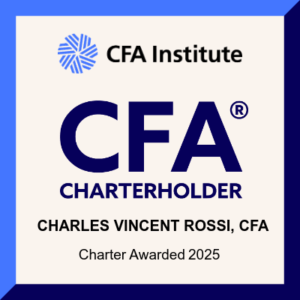
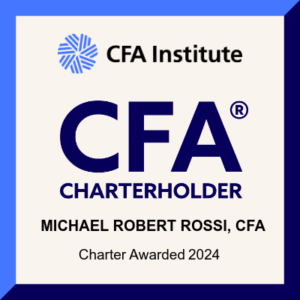
CFA® ‒ Chartered Financial Analyst®
CFA®
Chartered Financial Analyst®
The Financial Times refers to the CFA® professional qualification as the “hardest exam in finance.”1 On average, it takes over four years to complete the full program.2
The Chartered Financial Analyst® (CFA®) is a globally-recognized professional designation that measures and certifies the competence and integrity of financial analysts. Candidates are required to pass three levels of exams covering ethics, economics, quantitative methods, financial reporting and analysis, corporate issuers, equity and fixed income investments, derivatives, alternative investments, portfolio management and wealth planning. The charter is awarded by the CFA Institute.
- Bachelor’s degree or higher, plus
- A passing score on the Level I examination, plus
- A passing score on the Level II examination, plus
- A passing score on the Level III examination, plus
- 4,000 hours of qualifying work experience, plus
- Professional references, plus
- Adhering to the CFA Institute’s Code of Ethics and Standards of Professional Conduct, plus
- Acceptance by the CFA Institute
1 June 5, 2022
2 CFA Institute, 2023
CFP® ‒ CERTIFIED FINANCIAL PLANNER®
CFP®
CERTIFIED FINANCIAL PLANNER®
Becoming a CFP® requires years of experience, successful completion of standardized exams, a demonstration of ethics, and a formal education. A Certified Financial Planner® has completed a CFP® Board Registered Program of study covering professional conduct and regulation, financial planning, risk management and insurance planning, investment planning, tax planning, retirement planning and estate planning. The CFP® designation is awarded by the Certified Financial Planner Board of Standards, Inc.
Becoming a CFP® requires years of experience, successful completion of standardized exams, a demonstration of ethics, and a formal education.
A Certified Financial Planner® has completed a CFP® Board Registered Program of study covering professional conduct and regulation, financial planning, risk management and insurance planning, investment planning, tax planning, retirement planning and estate planning. The CFP® designation is awarded by the Certified Financial Planner Board of Standards, Inc.
- Bachelor’s degree or higher, plus
- Fifteen (15) semester credit hours of upper division undergraduate or graduate classes, plus
- A passing score on the 10-hour, two-day CFP® Certification Examination(pre-11/2014), or
- A passing score on the 6-hour, one day CFP® Certification Examination, (post-11/2014), plus
- 6,000 hours of qualifying financial planning work experience, plus
- Adhering to the CFP® Board’s Standards of Professional Conduct, plus
- Adhering to a Fiduciary Standard, plus
- Acceptance by the CFP® Board, plus
- 30 hours of Professional Continuing Education every two years, including ethics, plus
- Recertification annually
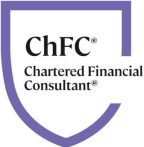
ChFC® ‒ Chartered Financial Consultant®
ChFC®
Chartered Financial Consultant®
Both Chartered Financial Consultants® and Certified Financial Planners® are qualified to provide professional personal financial planning services. The coursework requirements for the Chartered Financial Consultant® credential are more extensive than the coursework requirements for the Certified Financial Planner® credential. The Charter is awarded by The American College of Financial Services.
- Successful completion of the CFP® Certification Education Program, plus
- Additional coursework, plus
- Three years of qualifying work experience, plus
- Adhering to the American College Code of Ethics and Procedures, plus
- Acceptance by the American College of Financial Services, plus
- 30 hours of Professional Continuing Education every two years, including ethics, plus
- Recertification bi-annually.

ChSNC® ‒ Chartered Special Needs Consultant®
ChSNC®
Chartered Special Needs Consultant®
Chartered Special Needs Consultants® provide the specialized knowledge and financial planning tools for individuals with special needs, their families, and caregivers. The coursework requirements for the Chartered Special Needs Consultant® credential are more extensive and focused for special needs financial planning than the coursework requirements for the Certified Financial Planner® credential. The Charter is awarded by The American College of Financial Services.
- Bachelor’s degree or higher, plus
- Four years of relevant professional financial services experience, or
- Five years of professional experience in financial services or the practice of law
(with a focus on income tax and/or estate planning), plus
- Adhering to the American College Code of Ethics and Procedures, plus
- 30 hours of Professional Continuing Education every two years, including ethics, plus
- Recertification bi-annually.
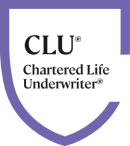
CLU® ‒ Chartered Life Underwriter®
CLU®
Chartered Life Underwriter®
Chartered Life Underwriters® complete extensive undergraduate or graduate coursework to develop an in-depth understanding of the practical, legal, and ethical aspects of life insurance underwriting, pensions, taxation, finance, retirement planning, estate planning, and planning for business owners. Chartered Life Underwriters® are educated in the protection, accumulation, preservation, and distribution of the economic values of human life. The Charter is awarded by The American College of Financial Services.
- Twenty-four (24) semester credit hours of upper division undergraduate or graduate classes, plus
- 6,000 hours of qualifying insurance work experience, plus
- Adhering to the American College Code of Ethics and Procedures, plus
- Acceptance by the American College of Financial Services, plus
- 30 hours of Professional Continuing Education every two years.
- Look for adherence to a Fiduciary Standard.
AEP® ‒ Accredited Estate Planner®
AEP®
Accredited Estate Planner®
The Accredited Estate Planner® credential is a graduate level specialization in estate planning, awarded only to estate planning professionals who meet special requirements of education, experience, knowledge, professional reputation, and character. Accredited Estate Planners® develop specialized estate planning knowledge. The credential is awarded and administered by the National Association of Estate Planners & Councils.
- Currently a JD, CPA, CFP , ChFC , CLU or CTFA, plus
- Good standing with their professional organization and not subject to disciplinary investigation, plus
- Presently and significantly engaged in estate planning activities, plus
- Completion of two graduate classes at the Richard D. Irwin Graduate School, plus
- Five years of estate planning work experience, plus
- Professional references, plus
- Acceptance by the National Association of Estate Planners & Councils, plus
- 30 hours of Professional Continuing Education every 24 months, including 15 hours in estate planning, plus
- Recertification annually.
- Look for adherence to a Fiduciary Standard.
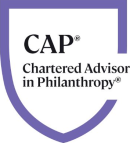
CAP® ‒ Chartered Advisor in Philanthropy®
CAP®
Chartered Advisor in Philanthropy®
The Chartered Advisor in Philanthropy® is a graduate-level program that provides the specialized knowledge and tools wealth advisors need to help clients articulate, advance and achieve their personal and family aspirations and philanthropic ambitions with expertise in taxation, fundraising, purposeful planning, family dynamics, and psychology. The Charter is awarded by The American College of Financial Services.
- Nine (9) semester credit hours of graduate level classes, plus
- Three years of qualifying philanthropic work experience, plus
- Adhering to the American College Code of Ethics and Procedures, plus
- Acceptance by the American College of Financial Services, plus
- 30 hours of Professional Continuing Education every two years, plus
- Annual recertification.
- Look for adherence to a Fiduciary Standard.
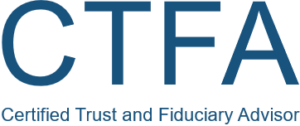
CTFA ‒ Certified Trust and Fiduciary Advisor
CTFA
Certified Trust and Fiduciary Advisor
The Certified Trust and Fiduciary Advisor (CTFA) is a professional designation offered by the American Bankers Association (ABA), which provides training and knowledge in taxes, investments, financial planning, trusts, and estates. A Certified Trust and Fiduciary Advisor provides expertise for the provision of fiduciary services related to trusts, estates, guardianships and individual asset management accounts. The Certified Trust and Fiduciary Advisor credential is awarded by the American Bankers Association.
- Bachelor’s degree or higher, plus
- Five years of qualifying wealth management work experience, plus
- A passing score on the CTFA Certification Examination, plus
- Professional references, plus
- Adhering to the Institute of Certified Bankers Professional Code of Ethics, plus
- Acceptance by the Institute of Certified Bankers, plus
- 45 hours of Professional Continuing Education every three years, plus
- Annual recertification.
- Look for adherence to a Fiduciary Standard.
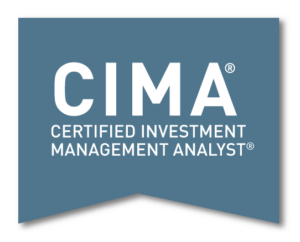
CIMA® ‒ Certified Investment Management Analyst®
CIMA®
Certified Investment Management Analyst®
Certified Investment Management Analyst® (CIMA®) certification is the peak international, technical portfolio construction certification designed for investment consultants, researchers, advisors, and wealth management professionals. The CIMA® certification provides sophisticated investment knowledge, along with the practical techniques to meet the real-world needs of individual and institutional investors. The Certified Investment Management Analyst® credential is awarded by the Investments and Wealth Institute.
- A passing score on the Qualifying Examination, plus
- Attending a CIMA® registered educational program, plus
- A passing score on the Certification Examination, plus
- Three years of qualifying financial services work experience, plus
- Adhering to the Investments & Wealth Institute’s Code of Professional Responsibility, plus
- Acceptance by the Investments & Wealth Institute, plus
- 40 hours of Professional Continuing Education every two years, plus
- Bi-Annual recertification.
- Look for adherence to a Fiduciary Standard.

CPWA® ‒ Certified Professional Wealth Advisor®
CPWA®
Certified Professional Wealth Advisor®
Certified Private Wealth Advisor® (CPWA®) certification is an advanced education and voluntary standard for advisors who serve high-net-worth clients. It’s designed for seasoned professionals who seek the latest, most advanced knowledge and techniques to address the sophisticated needs of clients with a minimum net worth of $5 million. Unlike credentials that focus specifically on investing or financial planning, the CPWA program takes a holistic and multidisciplinary approach. The Certified Professional Wealth Advisor® credential is awarded by the Investments and Wealth Institute.
- A passing score on the Qualifying Examination, plus
- Attending a CPWA registered educational program, plus
- A passing score on the Certification Examination, plus
- Five years of qualifying financial services work experience, plus
- Adhere to the Investments & Wealth Institute’s Code of Professional Responsibility, plus
- Acceptance by the Investments & Wealth Institute, plus
- 40 hours of Professional Continuing Education every two years, plus
- Bi-Annual recertification.
- Look for adherence to a Fiduciary Standard.
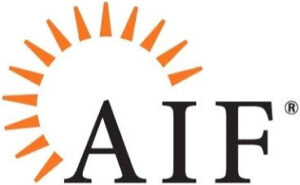
AIF® ‒ Accredited Investment Fiduciary®
AIF®
Accredited Investment Fiduciary®
The Accredited Investment Fiduciary® (AIF®) credential demonstrates that a designee has met educational, competence, conduct and ethical standards to carry out a fiduciary standard of care and serve the best interests of their clients. The Accredited Investment Fiduciary® (AIF®) credential is awarded by fi360 and The Center for Fiduciary Studies.
- Bachelor’s degree or higher and a professional credential, plus
- Completion of a minimum of twenty (20) required hours of training courses, plus
- Completion of required capstone course, plus
- Two years of relevant work experience, plus
- A passing score on the AIF Certification Examination, plus
- Adhering to the fi360 Code of Ethics and Conduct Standards, plus
- Adhering to a Fiduciary Standard, plus
- 6 hours of Professional Continuing Education every year, plus
- Annual recertification.
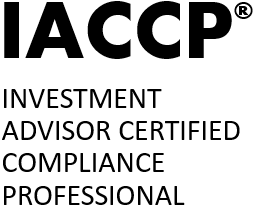
IACCP® ‒ Investment Adviser Certified Compliance Professional®
IACCP®
Investment Advisor
Certified Compliance Professional®
The Investment Adviser Certified Compliance Professional® credential certifies a compliance officer’s knowledge of investment advisory regulatory obligations, and additional competency in trading, regulatory mandates and other current regulatory priorities. The Accredited Investment Fiduciary® (AIF®) credential is awarded by NRS | ComplySci.
- Completion of fifteen (15) required regulatory compliance courses, plus
- Completion of five (5) elective regulatory compliance courses, plus
- Two years of compliance work experience, plus
- Submission of an ethics commitment and assessment, plus
- A passing score on the IACCP Certification Examination, plus
- 6 hours of Professional Continuing Education every year, plus
- Annual recertification.
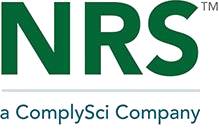
NRS Investment Adviser Core Compliance Program Certificate
NRS Investment Adviser
Core Compliance Program Certificate
The NRS Investment Adviser Core Compliance Program provides essential training on the Investment Advisers Act of 1940, and a foundation of professional competence necessary to help support and strengthen an investment advisory firm’s compliance program administration. The Investment Advisor Core Compliance Program is administered by NRS|Comply.
- Completion of ten (10) regulatory compliance courses, plus
- Submission of Ethics commitment and assessment
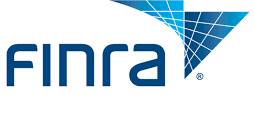
Financial Industry Regulatory Authority (FINRA) Series 65 Uniform Investment Adviser Law Exam
Financial Industry Regulatory Authority
(FINRA) Series 65
Uniform Investment Adviser Law Exam
The Series 65 exam is designed to qualify a candidate as Investment Adviser Representative (IAR) of a Registered Investment Adviser (RIA). The exam covers topics that have been determined to be necessary to understand in order to provide investment advice to clients. The FINRA Series 65 license is required to provide financial advice or services on a non-commission basis. Financial planners or advisors who provide financial planning or investment advice for an hourly fee are required to hold a Series 65 license. The exam is prepared by the North American Securities Administrators Association (NASAA) and administered by FINRA.
Wealth Management Advisor Interview Guide
Use our proprietary interview guide, Selecting a Wealth Management Professional, in your advisor search process as you conduct your personal due diligence and dig deeper with more targeted questions during your interview with us and other Scottsdale financial advisors
Wealth Management Advisor Interview Guide
Use our proprietary interview guide, Selecting a Wealth Management Professional, in your advisor search process as you conduct your personal due diligence and dig deeper with more targeted questions during your interview with us and other Scottsdale financial advisors


